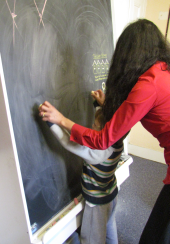More than ever with the visual demands of computers and the amount of near vision performed by children and adults alike, our visual system can become fatigued. Eye discomfort, headaches, blurred vision may be experienced with this prolonged use of the eyes for near vision. Today, in school, at work and at home children and adults are required to deal with sustained near vision tasks. As a result there is a constant stress on the visual system.
![]()
When visual stress is present, people may react in these ways...
- Avoid the task by doing as little as they can get by with
- Experience pain or other symptoms
- Close one eye
- Develop myopia or astigmatism
For most people the response to visual stress is reduced achievement and understanding. To find out if you have vision problems or for further information please contact us.



The following symptoms may indicate that you, or your child, has a
Vision Problem:
performance clues
- Avoidance of near work
- Frequent loss of place
- Omits, inserts, or rereads letters/words
- Confuses similar looking words
- Failure to recognise the same word in the next sentence
secondary symptoms
- Prefers subjects Maths/Science compared to English/History
- Low self-esteem
- Short attention span
- Day-dreaming
physical clues
- Red, sore, or itching eyes
- Jerky eye movements, one eye turns in or out
- Squinting, eye rubbing, or excessive blinking
- Blurred or double vision
- Headaches, dizziness, or nausea after reading
- Holds head too close to book when reading
- Holds head too close to desk when writing
- Head tilting, closing or blocking one eye while reading
Strabismus
- also known as an eye turn, wandering eye, crossed eye, or wall eye
Strabismus is a lack of coordination between the eyes. The eyes cannot work together, like most people’s eyes do, so they drift apart and look in different directions. This causes the brain to receive double images. If not treated early, strabismus can lead to loss of vision or amblyopia (lazy eye) where the brain suppresses, or ignores one of the images to avoid seeing double.

If you or your child experiences any of the above a learning related vision examination by a Behavioural Optometrist is recommended. To book one please contact us.